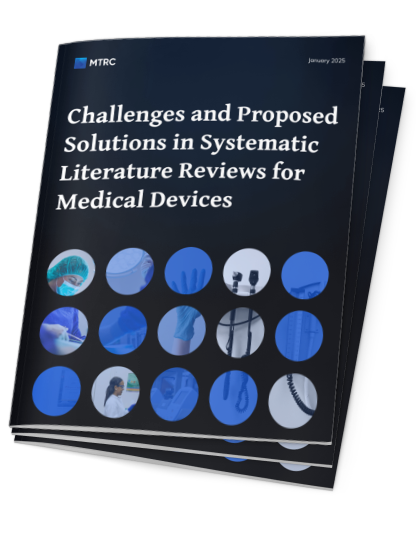MTRC develops and publishes systematic literature reviews and meta-analyses to advance medical device products with clinical, reimbursement and HTA audiences.
A systematic literature review (SLR) is a structured approach for gathering, reviewing, and synthesizing all available, relevant literature on a specific topic. Unlike traditional literature reviews that may be selective or prone to bias, SLRs follow a pre-defined, reproducible methodology. This ensures that every relevant study - whether it reports positive, negative, or inconclusive results - is carefully considered. By evaluating the quality of the research and summarizing findings in a transparent manner, SLRs paint a complete and unbiased picture of the evidence base.
Systematic literature reviews are a cornerstone for achieving acceptance and endorsement of new medical devices within clinical communities, professional societies, reimbursement authorities, and health technology assessment (HTA) bodies.
However, conducting robust SLRs and meta-analyses for medical devices and in-vitro diagnostic (IVD) tests can be uniquely challenging due to many factors, including:
- Scarcity of controlled studies: Many medical device evaluations rely on observational data, creating gaps in the evidence base
- Diverse Study Designs: Combining insights from case series, before-and-after studies, and cohort analyses requires specialized expertise to ensure methodological rigor
- Risk of Bias Assessment: There are complexities and a lack of standardized approaches for the assessment of the risk of bias in non-RCT studies
- Varying Outcome Measures: Presence of various types of poorly standardized outcomes
- Device Generations: Ongoing iterations and improvements to devices introduce an additional layer of complexity when comparing results over time
Medical technology companies operate under tight budgets, yet they must still produce high-quality and timely systematic reviews to satisfy stakeholders. Many consultancies focus primarily on pharmaceutical products, often overlooking the distinctive methodological and financial requirements that medical device developers face. This gap calls for specialized expertise and tailored approaches to evidence synthesis.
MTRC brings a unique blend of Market Access, Evidence Synthesis, and Health Economics & Outcomes Research (HEOR) expertise to the table. Our team understands the complex landscape of medical devices and IVDs, and we excel at developing and publishing systematic literature reviews and meta-analyses that resonate with clinical, reimbursement, and HTA audiences worldwide.
Contact us today to learn how our specialized SLR and meta-analysis services can help your organization strengthen its evidence base, streamline market access, and drive adoption of your innovative medical technologies around the globe.
Comprehensive Evidence Synthesis Services
At MTRC, we offer a versatile portfolio of systematic review services tailored to the unique needs of medical device and IVD companies. Our offerings include two core activities:
Systematic Literature Reviews (SLRs)
Extensive Database Searches: We conduct searches across Medline, Medline In-Process, EMBASE, and the Cochrane Library to capture all relevant studies
Dual Screening Process: Two independent reviewers screen each study for maximum rigor and transparency
PRISMA-Compliant Reporting: Our systematic reviews follow international best practices, ensuring high-quality, reproducible results
Reference Library: We provide a comprehensive library of all references for easy future access
Versatile Outputs: Whether you plan to publish in a peer-reviewed journal, present at a conference, or use the insights internally, our SLRs offer credible, actionable evidence
Systematic Literature Reviews with Meta-Analysis
All the Benefits of SLRs: Includes everything covered under our standard systematic review service, from dual screening to PRISMA-compliant reporting
Meta-Analysis Component: We integrate quantitative data from multiple studies to derive powerful, statistically robust conclusions, enhancing the impact and clarity of your evidence base
Meet the Evidence Synthesis Lead

Evidence Synthesis Activities at MTRC are Led by Sandeep Moola, PhD
Sandeep Moola holds a Doctorate in Evidence-Based Healthcare from the University of Adelaide, Australia, and a clinical foundation from Rajiv Gandhi University of Medical Sciences, India. He currently serves as an Adjunct Associate Lecturer at the University of Adelaide. Additionally, he is a member of the advisory group for The Evidence Synthesis Taxonomy Initiative, a global collaboration aimed at creating a living taxonomy for evidence synthesis.
Sandeep’s professional journey includes significant roles at Sanofi, where he worked as a Manager in the Health Economics and Value Assessment (HEVA) department. He also held Research Fellow positions at the George Institute for Global Health and the Joanna Briggs Institute (JBI). JBI is a renowned institution that contributes significantly to the body of evidence informing healthcare decisions worldwide. It creates international evidence-based guidelines and maintains a comprehensive database housing systematic reviews and implementation reports. During his tenure of over 10 years at JBI, Sandeep led and contributed to the development of research synthesis methodologies, critical appraisal tools, and software solutions for various types of systematic literature reviews and clinical audits.
Throughout his career, Sandeep and his team have undertaken impactful projects, including studies on smoking advertising and lung cancer risk factors for Cancer Australia and the National Health and Medical Research Council. These studies significantly influenced national policy changes in the country.
Sandeep’s core expertise encompasses systematic literature reviews, meta-analyses, evidence gap analyses, and value dossiers. With approximately 30 publications to his name, he demonstrates extensive expertise in evidence synthesis and knowledge dissemination.
Get Insights from MTRC Free Analytical Reports
Explore free MTRC analytical reports and white papers for in-depth insights into systematic review and value presentation for medical technologies in Europe

Explore MTRC research papers:
- Challenges and Proposed Solutions in SLR for Medical Devices (Report #15)
- Value Dossiers for Medical Technologies: What, When and How? (Report #12)
- Best Reporting Checklists for Studies of Medical Devices (Report #20)
- hallenges of HTA and Reimbursement Submissions for Medical Devices (Report #18)
- Challenges of Health Economic Evaluations of Medical Devices (Report #10)
Get in Touch
Contact us to discuss your needs and learn about our services
